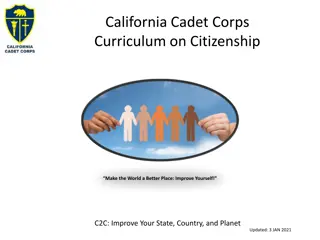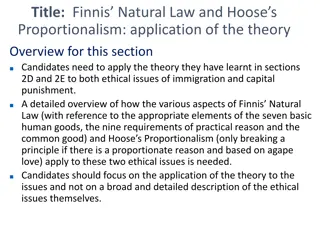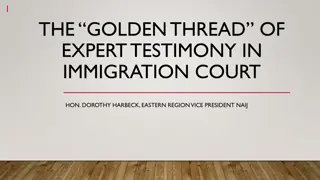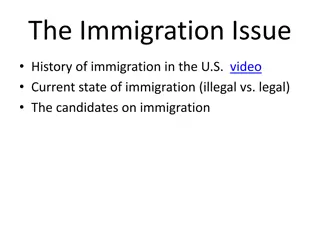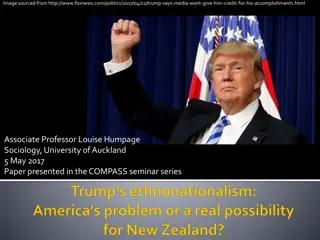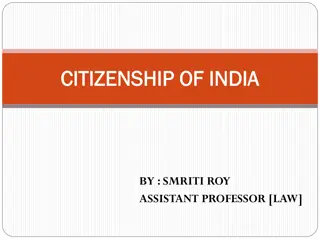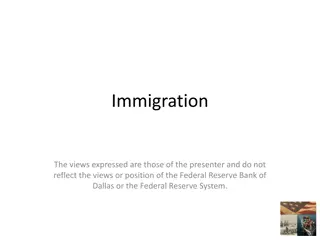Citizenship and Immigration in Modern Democracies
Citizenship, a fundamental institution of modern democracies, defines the relationship between individuals and the state through reciprocal rights and duties. However, citizenship has a dual nature, serving to both include certain individuals as citizens and exclude others. Immigrants residing within a nation's borders further complicate citizenship dynamics, highlighting the stratification of rights among different categories of migrants. The progression of rights for immigrants typically starts with social rights upon entering the labor market, followed by civil rights and, eventually, political rights. Moreover, the concept of citizenship extends beyond national boundaries, giving rise to supranational, transnational, and local forms of citizenship.
Download Presentation

Please find below an Image/Link to download the presentation.
The content on the website is provided AS IS for your information and personal use only. It may not be sold, licensed, or shared on other websites without obtaining consent from the author.If you encounter any issues during the download, it is possible that the publisher has removed the file from their server.
You are allowed to download the files provided on this website for personal or commercial use, subject to the condition that they are used lawfully. All files are the property of their respective owners.
The content on the website is provided AS IS for your information and personal use only. It may not be sold, licensed, or shared on other websites without obtaining consent from the author.
E N D
Presentation Transcript
Immigration and citizenship Maurizio Ambrosini, universit di Milano, direttore della rivista Mondi migranti
Citizenship Citizenship, since the Revolutions of the XVIII century, is a basic institution of modern democracies It establishes the relation between the individual and the State, in terms of reciprocal rights and duties But it has a double meaning: it is a device to include some people (who enjoy the status of citizens) and to exclude other people (who are not citizens)
Citizenship, nation and immigrants The citizenship still maintains a strong connection with the national State But the case of immigrants highlights the fact that it is becoming more complex: immigrants live on the national territory, but in principle they are not citizens
Civic stratification Immigrants are not all the same: they can enjoy different statuses and rights From EU citizens, to permanent residents, to short term sojourners, to unauthorized migrants There are not people without any rights, but they are deeply stratified in terms of rights
Citizenship rights The main point of reference is Marshall s typology: - civil rights - political rights - social rights But Marshall wrote immediately after the WW2, and he did not take into account international immigrants
The access to rights by immigrants When immigrants arrive and enter the labour market, Marshall s sequence is reversed The first rights they achieve are social rights Then (some) civil rights are added (freedom of religion, family reunifications) The last and more difficult to achieve are political rights Lack of political rights makes more unstable the other rights
Beyond national citizenship upward, forms of supranational or transnational citizenship emerge (e.g., in EU, or in the countries of origin); downward, local forms of citizenship arise
Meanings of citizenship (Zincone) 1) Belonging to a State: citizens as opposite to stranger 2) Emancipation: citizen as opposite to subject, or even slave 3) Endowment with benefits: citizen as opposite to socially excluded 4) Standardization (equality): citizen as opposite to member of a particular community The dimension of identification can be added
Citizenhip and identity The citizenship has also a cultural and psychological dimension, which is connected to processes of identification Immigration raises the issue of double belonging and double citizenship The nation of origin is often perceived as a source of (feelings of) belonging, the receiving nation as a source of rights Receiving States have historically feared the lack of loyalty by foreign immigrants
National citizenship and human rights After WW2, the development of human rights states rights which go beyond national citizenship. They belong to human beings, without reference to their nation But national States remain responsible to grant such rights A tension arises, between citizenship rights and human rights, between universal norms and national States
Transnational citizenship? Researchers have observed the development of forms of civic participation which cross the national borders: Voting from abroad Taking part in political demonstrations (in the streets, on internet ) Collecting funds for the homeland Gathering and acting through religious institutions
Two transnational developments Vote from abroad in political elections Double citizenship But also naturalizations grow: about 900,000 in the EU in last years (and the same in the USA) Fears about racism, discrimination, forced repatriations push towards the access to local citizenship
Legal rules to naturalization Ius sanguinis: right of blood Ius soli: right of birth Iusconnubii: right of marriage Iusdomicilii: right of residence Iusculturae: right of cultural acquisition through education
Trends in citizenship laws Laws are changing more frequently Reduction of the right of birth (but the USA resist) Better treatment of new generations, easier procedures of naturalization 5 years of residence are the more common rule (in the EU and in the USA) More emphasis on the acquisition of language and cultural values (civic integration)
Citizenhip from below A body of literature in last years has emphasized practices of citizenship from below , or lived citizenship (Lister) Citizenship as a process, as a practice, as a day by day construction Citizenship is not only just a legal status granted by the State, but it is actively constructed through action and participation in the public space
Acts of citizenship those acts that transform forms (orientations, strategies, technologies) and modes (citizens, strangers, outsiders, aliens) of being political by bringing into being new actors as activist citizens (claimants of rights and responsibilities) through creating new sites and scales of struggle (Isin, 2008) - In the original version, acts of citizenship are political, militant, subversive: they are acts of rupture with the political and social order
A differentvision I see acts of citizenship as acts by whom individuals and groups achieve rights, improve their participation in receiving societies, become more members of the polity They are mainly intentional choices and formal acts: reunite the family, sign a contract, join a trade-union
Localized citizenhip localized individuals (typically, irregular immigrants) can be unauthorized yet recognized everyday practices: residing in a town, holding down a job, connecting with their employers families, taking part in social networks of friends and neighbours, raising a family, schooling their children, so that they participating in the local communitydespite not having legal status. citizenship (S. Sassen): some in their
Citizenshipas a dynamic process Citizenship is not a fact, but a process. It does not only descend from above it is also negotiated from below; it is not only a political institution it is alsoa set of social practices. Its beneficiaries are not mere passive subjects of concessions granted by the host state; rather, they are actively engaged in the process of widening the legitimate social base of the societyof which theychoose to be part.
Participation beyond formal citizenship Become a member of trade-unions Join immigrant associations Take part in demonstrations, protests, social movements Be active in volunteering, and in associations of volunteers Gather in religious institutions and take part in their social activities
Conclusions Legal citizenship is relevant, but not exclusive Migrants, as other residents, can develop forms of citizenship from below These practices can affect the political level and the social recognition of immigrants The local dimension is particularly crucial in these processes


















